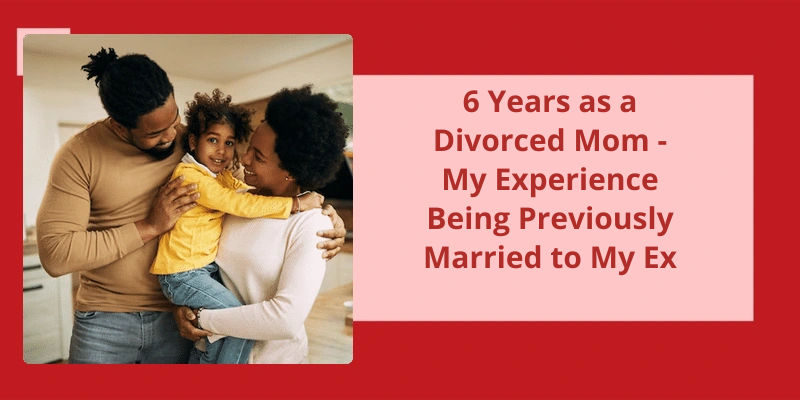-husband for 10 years before that. After my divorce, I’d to navigate life as a single parent, while also dealing with the emotional aftermath of a failed marriage. It was a time of immense growth and self-discovery, as I learned to rely solely on myself and my own capabilities. While it was definitely a challenging experience, it also gave me a newfound sense of independence and strength. As the years have passed, I've continued to adapt and evolve, finding joy and fulfillment in both my role as a mother and in my personal life. While divorce is never easy, I’ve come to appreciate the lessons it’s taught me and am grateful for the person it’s helped me become.
Is the First Relationship After Divorce Always a Rebound?
But, that intensity can also be harmful, since you may be trying to fill a void with someone who may not be the best fit for you in the long term. It’s important to take time to reflect on what went wrong in your previous marriage, and work on healing and improving yourself before jumping into another relationship.
However, thats not to say that all first relationships after divorce are rebound relationships. It could be a genuine connection with someone who just happened to enter your life at the right time. It’s important to go into any new relationship with a clear mind and be honest with both yourself and your potential partner about your feelings and intentions.
Additionally, what counts as a rebound relationship can be subjective. It’s important to not judge yourself or others too harshly based on their timing in the dating world post-divorce.
It’s also possible to use your first post-divorce relationship as a learning experience. Take note of what you enjoy and what you don’t enjoy in the relationship, and use that knowledge to inform future relationships. It’s important to not let the fear of having a rebound relationship hold you back from putting yourself out there and potentially finding a fulfilling partnership.
Ultimately, the best way to avoid a rebound relationship is to take the time to properly heal and reflect on your previous marriage before entering the dating world again. Work on improving yourself, your communication skills, and your ability to spot red flags in potential partners. By doing so, you increase your chances of finding a successful and meaningful relationship post-divorce.
How to Know if You Are Emotionally Ready to Start Dating Again After a Divorce
- Reflect on the reasons why your marriage ended
- Take time to heal and process your emotions
- Consider seeking therapy or counseling
- Assess your readiness for commitment
- Focus on self-care and self-improvement
- Be honest with yourself and potential partners
- Start with casual dating and set realistic expectations
- Trust your gut and listen to your intuition
- Don’t rush into anything or settle for less than you deserve
Moving on from a divorce can be a long and difficult journey, especially when it comes to letting go of the love you once had for your ex-partner. It’s normal to wonder whether or not you can still love someone after a divorce, and the answer isn’t always clear cut. In this article, we will explore the complex emotions surrounding love and divorce and offer insight into whether or not it’s possible to love your ex after the marriage has ended.
Can You Love Your Ex After Divorce?
It’s normal to feel conflicted about your emotions towards your ex after a divorce. On one hand, you may feel relief and freedom after ending a rocky relationship. But on the other, you may experience moments of longing and nostalgia for the intimacy you once shared. These feelings are valid and shouldnt be ignored.
It’s important to note that loving an ex after divorce doesn’t necessarily mean you want to reconcile or rekindle the relationship. Love takes on many different forms, and it’s possible to love someone from afar or in a different capacity. Perhaps you still care for your ex as a person, respect their qualities and achievements, or even appreciate the time you spent together. These types of love don’t have to threaten your current relationships or interfere with your personal growth.
That being said, it’s also important to recognize when your love for your ex is hindering your ability to move on. If you find yourself constantly thinking about them, stalking their social media, or comparing potential partners to them, it may be time to reevaluate your emotions. Holding onto past love can prevent you from fully healing and accepting the end of a chapter. It’s okay to acknowledge your feelings, but it’s also important to actively work towards moving forward.
Another factor to consider is whether your ex still holds space in their heart for you. Loving someone who’s no longer in love with you can feel overwhelming and painful. It’s important to respect their boundaries and wishes, even if it’s hard to let go. If reconciliation is a possibility, make sure to communicate openly and honestly with both yourself and your ex. Remember that love alone isn’t enough to sustain a healthy relationship.
It’s important to give yourself time and space to heal, accept, and move on at your own pace. Trust your instincts and surround yourself with supportive people who uplift and validate your journey. Remember that loving an ex doesn’t define your worth or potential for future love and happiness.
How to Cope With Co-Parenting After Divorce When You Still Love Your Ex
- Establish clear boundaries and communication with your ex about co-parenting expectations.
- Acknowledge your feelings and allow yourself to grieve the loss of the relationship.
- Focus on the well-being of your children and prioritize their needs.
- Seek the support of a therapist or support group to help navigate the emotional challenges.
- Find healthy and constructive outlets for your emotions, such as exercise or creative activities.
- Avoid negative talk about your ex in front of the children.
- Be flexible, open-minded, and willing to compromise for the sake of the children.
- Set aside personal differences and work towards a cooperative co-parenting relationship.
- Remember that co-parenting after divorce takes time, patience, and commitment.
Source: Should you still love your ex-partner wife/husband?..
Conclusion
Being a divorced mom for the past six years has been a challenging journey, filled with ups and downs, but also one that’s brought immense growth and strength. While the road may have been bumpy at times, I’ve learned to navigate it by relying on my inner reserves of resilience, determination, and love for my children. As I look back on my past experiences, I can see how they’ve shaped me into the person I’m today, and how even difficult situations can provide opportunities for growth and transformation. Divorce may have ended one chapter of my life, but it’s also given me the chance to write a new one, filled with hope, love, and possibility. Ultimately, I believe that my journey as a divorced mom has made me a stronger and more compassionate person, one who’s better equipped to face whatever challenges may come my way.






